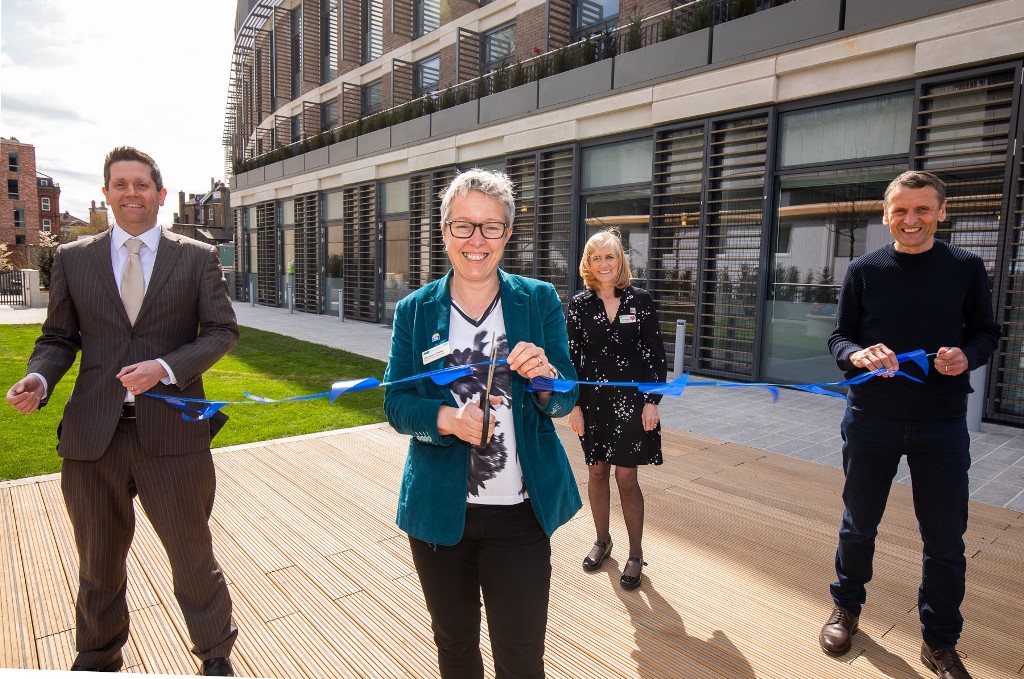
Scientists are preparing to move into an ultra-modern research facility which will allow them to work more closely with clinicians to develop treatments and cures for some of the most devastating diseases of the immune system.
The £60m Pears Building, which was today handed over to the Royal Free Charity by the construction company, has been created as a result of a groundbreaking collaboration between the Royal Free Charity, UCL and the Royal Free London NHS Foundation Trust. It will not only bring the theory and implementation of research much closer together but will also allow the public easy access to the latest discoveries in immunology.
It will become the new home of the UCL Institute of Immunity and Transplantation (IIT), in Pond Street, Hampstead, one of the largest patient-focused immunology centres in Europe.
Designed by the multi award-winning firm Hopkins and built by Willmott Dixon, the Pears Building has a light-filled interior with dramatic acoustic panelling and bespoke timber meeting room “pods”. These, and other spaces in the building, are designed to maximise the opportunities for interaction, between users of the building, between researchers and their clinical colleagues in the neighbouring Royal Free Hospital and with the surrounding community.
The building will be able to accommodate up to 200 researchers looking for cures and new treatments for global health problems including type 1 diabetes, cancer and organ rejection after transplantation, enabling it to attract further world-class talent. They will work in the most up-to-date laboratories with adjacent write-up facilities.
Local people will also be welcomed into a community café and invited to face-to-face updates with researchers, who will also maximise opportunities for patients to take part in clinical trials. Those taking part in research will be offered accommodation on the top floors of the building, many with stunning views across Hampstead Heath.
The building will also contain offices for the Royal Free Charity and include a 71-space car park for patients and visitors. It has been designed to complement the local area, with set-back terraces on the upper levels which allow light into the spaces behind the building.
“In the Pears Building we have a world class laboratory research facility and a beautiful space designed to facilitate a unique partnership between scientist and clinician,” said Professor Hans Stauss, director of the IIT. “This will enable us to convert discoveries made in the laboratory into cures and treatments more quickly.
“Our COVID-19 work during the pandemic has reinforced the importance of understanding and modulating the immune system. In the Pears Building we will be able to expand the institute and so create a fabulous opportunity to release the potential of immunity-based treatments in cancer, diabetes, HIV, hepatitis and COVID-19, as well as developing new therapies to stop the rejection of transplants.”
Jon Spiers, chief executive of the charity, said: “This stunning new building marks a major leap forward for research, treatment and care in north London. Under one roof, we’ll have world-leading researchers, accommodation for patients, parking for visitors, a café for the community and a new home for the Royal Free Charity.
“None of this would have been possible without the incredible generosity of a number of visionary philanthropists, including the Pears Foundation, who have supported the project from the outset.”
Professor David Lomas, UCL vice provost (health), said: “This joint project between UCL, the Royal Free London NHS Foundation Trust and the Royal Free Charity will better address many global health challenges and offer real benefits to patients.
“The new facilities and the co-location of doctors, nurses, scientists and patients within the Pears Building will further enhance the quality of our exceptional research and allow us to generate and apply new knowledge to tackle the most pressing health challenges of the 21st century.”
Caroline Clarke, Royal Free London group chief executive, highlighted the benefits to patients of the IIT’s new home. “Our expansion of the institute will give many more of our patients the opportunity to take part in ground-breaking research.
“As well as providing more space for scientists to develop better treatments for cancer, diabetes, HIV and tuberculosis, and to support transplantation, the new centre will play its part in crucial research into COVID-19, helping the international effort to tackle this devastating virus. This important work will contribute not only to the health and wellbeing of our local community but be a world-leading centre for understanding the human immune system.”
Ernest Fasanya, director, Hopkins Architects, said: “In designing the Pears Building, we have been inspired by the exceptional research and clinical ambitions of our clients. We wanted to deliver a sustainable building that would support their endeavours, with welcoming interiors and well-designed spaces that enable true collaboration between scientists and researchers.
“We’ve relished the opportunity to design a building with enhanced public realm, improving connectivity with the adjacent hospital and providing much needed green space to support the well-being of users, as well as the wider Hampstead community.”
Chris Tredget, managing director, Willmott Dixon, said: “We are incredibly proud to be handing over the Pears Building as it becomes the new home of the IIT. The building will provide a world-class facility which will be home to groundbreaking research, helping to find cures and treatments for life-threatening diseases.
“We are proud of the team’s innovation to embed safe working practices to allow construction of this vital project to continue during the pandemic. We take immense pride in knowing the facility will be used for world class research, benefitting both the local community as well as internationally.”
(Pic L-R: Jon Spiers, chief executive of the Royal Free Charity, Caroline Clarke, Royal Free London group chief executive, Kate Slemeck, Royal Free Hospital chief executive and Professor Hans Stauss, director of the IIT)
 Translate
Translate